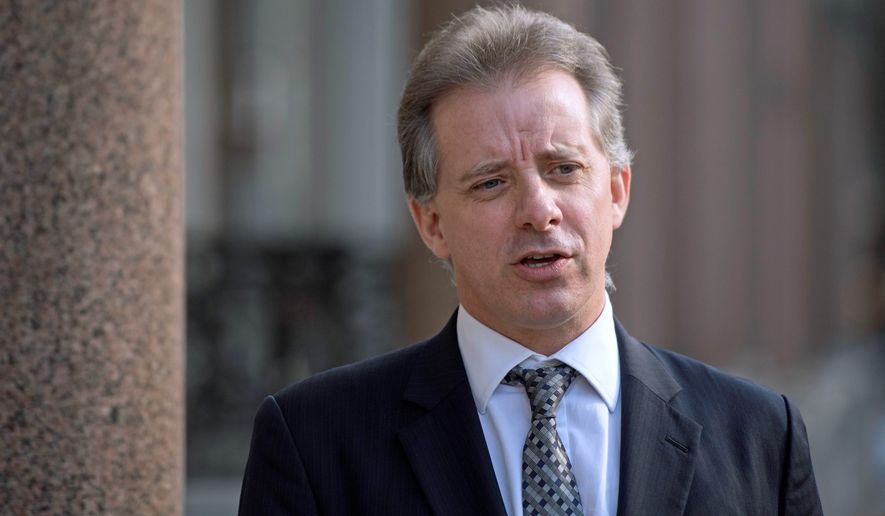The anti-Trump dossier published by BuzzFeed on Jan. 10, 2017, was a “f—ked-up document,” one of the news outlet’s investigative reporters says.
Reporter Anthony Cormier made the blunt assessment at a investigative journalism symposium. He is a prominent player in the BuzzFeed investigative unit that obtained the dossier but wasn’t a story author.
His remark came after Special Counsel Robert Mueller’s report discredited all of the dossier’s Trump charges, according to a review by The Washington Times.
BuzzFeed Editor Ben Smith made the momentous decision to post the 35-page unverified dossier during President Trump’s transition, forever changing the discussion over Russian election interference.
The dossier was complied by ex-British intelligence officer Christopher Steele who was financed by the Hillary Clinton campaign and Democratic National Committee. He asserted there was an “extensive conspiracy” between the Trump campaign and the Kremlin to interfere in the 2016 election. Mr. Mueller said he found no such conspiracy.
“That f—ked up document,” Mr. Cormier said. “I’m going to say that. It was a f—ked-up document. I think we need to know more about where it came from. Why it is. What it means. But I still defend the right and decision to publish it because I believe in radical transparency. And if the U.S. government is passing that kind of intel to the president and president elect, I think you guys deserve to know.”
Mr. Cormier is referring to the fact that President Obama’s intelligence team briefed him on the accusations during the transition. Then-FBI Director James Comey then presented some of its charges to President-elect Trump at Trump Tower.
Mr. Cormier was the co-author of a January story that asserted that Mr. Trump directly ordered his former attorney, Michael Cohen, to lie to Congress about the timing of a proposed Moscow Trump Tower.
Mr. Mueller disputed the story at the time and his 448-report contains no such charge. It quotes Mr. Cohen as saying Mr. Trump told him to cooperate with Congress.
The Clinton camp made sure the dossier was as widely circulated as possible. Mr. Steele, along with Clinton campaign opposition research firm, Fusion GPS, and a Democratic Party law firm, spread dossier charges to the news media, Justice Department and FBI.
The FBI used the dossier to acquire at least one court-approved wiretap for a year on Trump volunteer Carter Page. The dossier said that on a public trip to Moscow in July 2016 he negotiated a bribe with Vladimir Putin aides in exchange for removing U.S. sanctions. Mr. Page consistently denied such a meeting ever occurred. He was never charged.
The dossier, written in June-December 2016, made other sensational charges. Mr. Steele, quoting Kremlin sources, said that Mr. Trump funded a U.S. computer hacking operation here and overseas, and used Russian embassy financing.
Mr. Steele’s allegations became fodder not just for the FBI but also for books and news stories.
The Washington Times reviewed 12 of Mr. Steele’s anti-Trump conspiracy charges. It found that none was substantiated by Mr. Mueller and most were rejected.
Mr. Cormier was on a journalism panel last week at the University of California, Berkeley. The topic: “Without Fear or Favor: Reporting on Trump.”
The panel was comprised of Mr. Cormier; Susanne Craig, New York Times; Michael Rothfeld, The Wall Street Journal and Mark Schoofs. He ran the BuzzFeed investigative unit at the time and was one of three dossier-story authors.
The Jan. 10, 2017 story proclaimed: “These Reports Allege Trump has Deep Ties to Russia.” The story contained a link to the full 17-memos.
The document was obtained by Ken Bensinger, one of three story authors, who photographed the pages while meeting with David Kramer. Mr. Kramer was an associate of Republican Sen. John McCain. A Steele associate enlisted Mr. McCain, who provided a copy to the FBI’s Mr. Comey after Mr. Kramer met with Mr. Steele in Surrey, England. During the transition, Mr. Kramer provided dossier information to at least eight news outlets.
In a libel case in Florida, BuzzFeed argued it had a right to publish because the dossier had become an important political and law enforcement document. A federal judge agreed, granting fair report privilege and dismissing a lawsuit by a Russian businessman named by Mr. Steele.
BuzzFeed spokesman Matt Mittenthal pointed out a quote from editor Smith in Vanity Fair.
“At the time we published it,” Mr. Smith said, “effectively everyone in the country, except for the broad public, had already seen it—intelligence officials, members of the press, politicians, large sections of the Washington chattering class. It had also been briefed to two presidents of the United States. That all stands up incredibly well, and there’s no doubt that this was an extremely important document in American history.”
• Rowan Scarborough can be reached at rscarborough@washingtontimes.com.




Please read our comment policy before commenting.